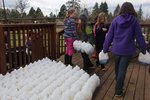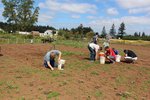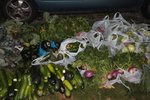


Donna and Ed Aho are the proud owners of 12.5 acres of land in Brush Prairie known as Beacon Farm, and their mission is to feed the hungry.
Since 2013 they’ve been growing all kinds of vegetables and donating them to the North County Community Food Bank (NCCFB). The farm’s production has been growing since the idea began, but it's reaching a point of “peak performance” given their resources. For the most part it’s Donna and Ed, sometimes their kids and sometimes their grandkids that do all the work. The farm work is open to volunteers — and there have been a decent amount through time — but for Beacon Farm to get to the next level, more are needed.
In the first year of their charitable project Beacon Farm was able to donate 700 pounds to the NCCFB. In 2014 the number rose to 1,200 pounds and then 4,400 in 2015. Because of rain issues in October last year they were only able to donate 3,500 pounds in 2016, but this year the goal is back up to 6,000.
“I definitely think we can get to 6,000,” Donna said. “Maybe 7,000.”
As time has gone on the Ahos have been able to grow more because they’ve expanded their garden. Originally they had one 70-by-250 feet strip of dirt to grow on, but that has since doubled. There are also several smaller gardens to the side, making for what Donna estimates to be 38,150 square feet of cultivated land on the Beacon Farm property. All of that isn’t even half of the total possible space that could be used for farming more vegetables, and that’s where her volunteer pitch comes in.
“We could extend the garden and do two to three times more,” she said. “But we need the help.”
Donna said most volunteers they’ve gotten are Girl Scouts, Boy Scouts and their families.
“We’re getting a lot done with not many hands. We are doing probably 80 percent of the stuff still,” she said.
Donna said volunteering is mostly done on Saturdays starting at about 10 a.m., but she is always open for other times. Volunteer time spent at Beacon Farm can also be used toward community service hours for qualifications and resumes. Most of all though, it’s the feeling of knowing you're helping somebody that is the biggest pay off, Donna said.
“Seven hundred families (in the community) need food every week,” Donna said. “We’re giving a lot to the food bank, but it’s still not very much when you really think about it. I want to do more.”
Volunteers that come out can expect to do weeding, harvesting and planting. The planting process at the farm has taken an interesting twist.
Not long ago Donna said she stumbled onto an online gardeners group and learned of a unique planting method. Instead of planting seeds directly into the earth, she and the team have started planting them inside milk jugs. The concept is called winter sowing. She said the benefit is plants can grow during the winter or harsh season conditions without as much vulnerability.
“They’re (the milk jugs) stronger than using greenhouses,” Donna said. “They’re getting conditioned by being outside too, so you don’t have to take them out and get them used to the outside like if they were in a greenhouse.”
Donna said any sort of jug can be used for this. She uses milk jugs because Andersen Dairy in Battle Ground had an excess amount of empty jugs in their dump trailer when she was searching and allowed her to take 2,000 of them for free.
Donna cuts the jugs in half (but not the handle) and fills the bottom with four or five inches of soil. After planting the seed she duct tapes the jug back together and pokes holes in the bottom and the side for draining. At that point all that’s left to do, she says, is stick them out in the field and let mother nature work her magic.
“I instantly knew it would be great when I saw the idea,” said Donna. “We just stick them out in the grass and forget about them. Everything about it just works better and they're healthier. You can control the soil better and there aren’t any slugs or birds messing with them either.”
Donna said about 700 of the 2,000 milk jugs are being used, which again circles back to the need for more help. The Ahos are doing everything they can to produce as much as they can for those in need. They keep nothing for themselves.
“99.9 percent of the vegetables we harvest are donated,” said Donna. The 0.1 percent are a few veggies she and other workers eat while gardening.
Beacon Farm is located at 21902 NE 189th Street, Brush Prairie. To get into contact with Donna or Ed Aho call 360-600-4037. You can also learn more at the farm's Facebook page: facebook.com/BeaconFarmHockinson.